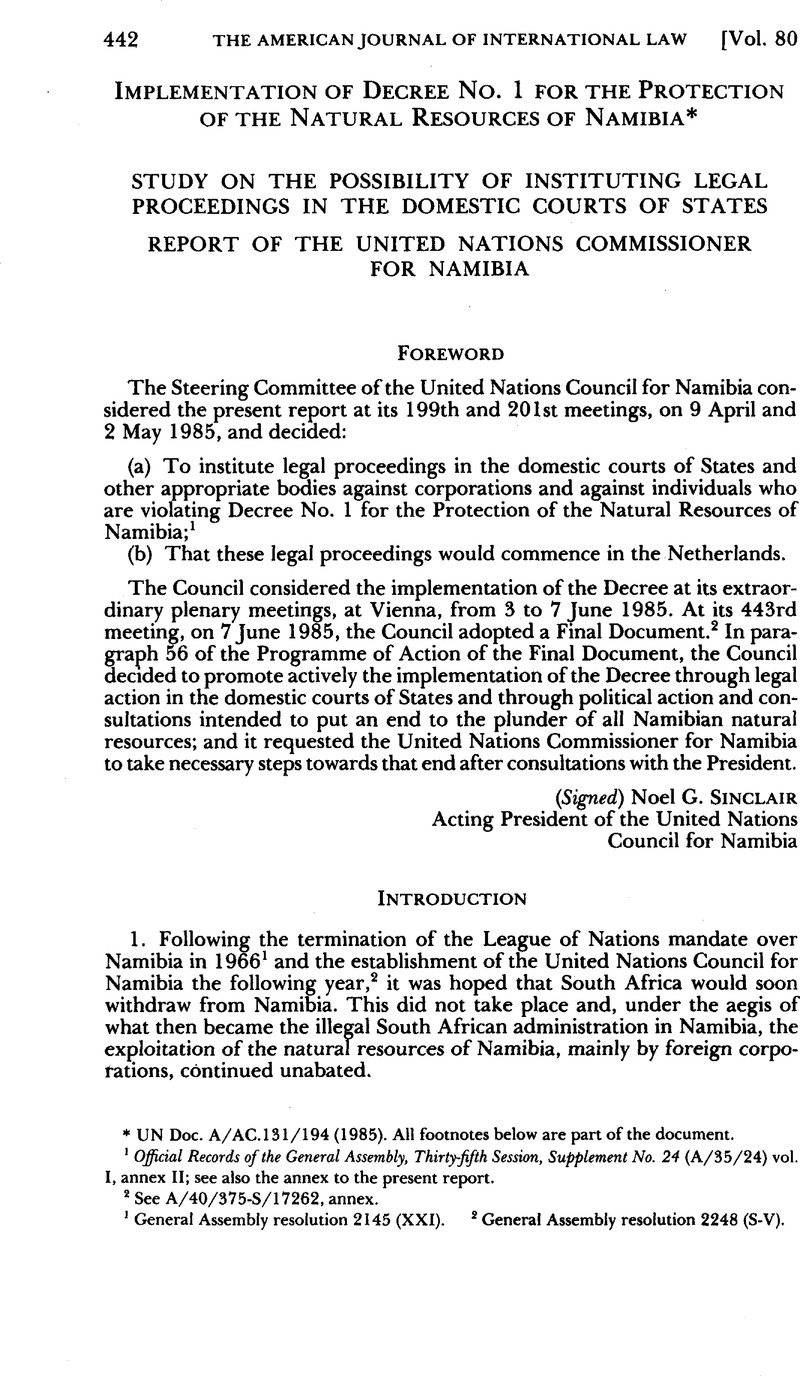No CrossRef data available.
Published online by Cambridge University Press: 27 February 2017

UN Doc. A/AC.131/194 (1985). All footnotes below are part of the document.
1 Official Records of the General Assembly, Thirty-fifth Session, Supplement No. 24 (A/35/24) vol. I, annex II; see also the annex to the present report.
2 See A/40/375–S/17262, annex.
1 General Assembly resolution 2145 (XXI).
2 General Assembly resolution 2248 (S-V).
3 Security Council resolutions 276 (1970) and 283 (1970).
4 Legal Consequences for States of the Continued Presence of South Africa in Namibia (South West Africa) notwithstanding Security Council Resolution 276 (1970), Advisory Opinion, I.C.J. Reports 1971, p. 16.
5 Official Records of the General Assembly, Thirty-fifth Session, Supplement No. 24 (A/35/24), vol. I, annex II; see also the annex to the present report.
6 A/AC.131/SR.209.
7 Official Records of the General Assembly, Twenty–ninth Session, Supplement No. 24A (A/9624/Add.1).
8 A/AC.131/81.
9 A/AC.131/80.
10 Official Records of the General Assembly, Thirty-fifth Session, Supplement No. 24 (A/35/24), vol. III.
11 General Assembly resolution 35/227 I.
12 A/AC.131/L.271.
13 A/AC.131/133.
14 A/AC.131/138.
15 A/AC.131/L.254.
16 The Vienna Convention on the Law of Treaties.
17 General Assembly resolution 22A (I).
18 Pasicrisie, 1953, III, 65.
19 General Assembly resolution 65 (II).
20 Security Council resolutions 283 (1970), 366 (1974) and 385 (1976).
21 See A/C.4/SR.2123.
22 In a broad sense or by extension”.
23 It should also be noted that, on 17 January 1984, the Netherlands Government informed a mission of consultation of the United Nations Council for Namibia that it recognized the Decree and was willing to co-operate in its implementation to the extent possible under its natural law (see A/AC.131/134, para. 19).
24 According to information contained in the report of the Council on the hearings on Namibian uranium (A/35/24, vol. Ill), Urenco is a uranium enrichment company operating under the aegis of the Federal Republic of Germany’s private company Uranit, the Netherlands company Ultra-Centrifuge Nederland (UCN) (of which the Netherlands Government owns some 98 per cent of the shares) and the United Kingdom State-controlled British Nuclear Fuels, Ltd. (BNFL). It was established in accordance with the Treaty of Almelo, to which the Governments of the three above-mentioned countries were signatories. The three partners each control an enrichment plant: BNFL has its factory at Capenhurst in the United Kingdom and Uranit and UCN both operate plants at Almelo in the Netherlands. A so-called joint committee, in which each partner has a representative, takes the policy-making decisions and is, therefore, responsible for the enrichment contracts signed by Urenco.
25 United Nations, Treaty Series, vol. 795, No. 11326, p. 275.
26 Parliamentary Debates, House of Commons (Hansard), 30 June 1982.
27 Ibid., 4 December 1974, col. 1565.
28 Ibid., cols. 1565–1566.
29 Official Statement, Parliamentary Debates, House of Commons (Hansard), 4 December 1974, col. 1566; and reply of Parliamentary Under-Secretary, Parliamentary Debates, House of Commons (Hansard), 20 July 1982, col. 95.
30 Valley Forge College v. Americans United for Separation of Church and State, Inc., United States Reports (1982), vol. 454, pp. 464 and 472.
31 That is, a power conferred on the General Assembly without reference to the Charter.
32 Department of State Bulletin No. 38 (7 July 1975).
33 Legal Consequences for States of the Continued Presence of South Africa in Namibia (South West Africa) notwithstanding Security Council Resolution 276 (1970), Advisory Opinion, I.C.J. Reports 1971, p. 54.
34 Resources in Namibia: Implications for United States Policy, Hearings before the House Subcommittee on International Resources, Food and Energy, Ninety-fourth Congress.
35 The substantive basis of the customary law of belligerent occupation governing property rights is provided by the Hague Convention of 1907. Under article 55, the Convention provides that inter alia: “The occupying nation shall consider itself merely as the administrator and usufructuary of the public buildings, real estate, forests, and farms. . .”. Under these rules, an occupant may act only as a usufructuary in relation to State–owned natural resources. Even where limited use of public property is allowed, excessive or abusive exploitation is characterized as “waste” and will be forbidden.
36 An injunction, in United States law, is a remedy to restrain a person from doing something or commanding them to do something. They are provisional or preliminary if they are granted upon the filing of the suit, or while the suit is pending, to restrain the party enjoined from doing or continuing to do the acts complained of, until the suit is decided or upon further order of the court. In the present case, the intention would be to try to enjoin the defendants from continuing to exploit Namibian resources.
* The following is the text of the Decree adopted by the Council at its 209th meeting, on 27 September 1974, approved by the General Assembly at its 2318th meeting, on 13 December 1979 (resolution 3295 (XXIX)), and published in the Official Records of the General Assembly, Thirty-fifth Session, Supplement No. 24 (A/35/24), vol. I, annex II.
* Legal Consequences for States of the Continued Presence of South Africa in Namibia (South West Africa) notwithstanding Security Council Resolution 276 (1970), Advisory Opinion, I.C.J. Reports 1971, p. 16.